By Camila Fernandez, Program Officer
At Enterprise we are committed to dismantling the enduring legacy of systemic racism in housing – in policy, practice and investment. This commitment has become central to the work we do, and our partnerships with adjacent sectors are essential to creating more equitable outcomes.
As part of this commitment, we're working to address housing barriers for those impacted by the criminal legal system. Building off our in-depth experience in Cleveland and New York, we're identifying effective housing models and scaling-up tried-and-tested solutions so formerly incarcerated people have safe, stable homes as they return to their communities and rebuild their lives.
This work is an opportunity to make a meaningful difference at the intersection of housing and criminal justice reform. The blog series on housing and the criminal legal system will highlight issues and best practices related to expanding access to housing for those impacted by the criminal legal system.
Criminal legal system reform is one of the most pressing civil rights issues of our day. People formerly incarcerated are often victims of housing discrimination and struggle with income instability, family reunification, and a need for employment services.
Black and Brown individuals, in particular, are impacted by the criminal legal system disproportionately and face debilitating legal restrictions once released. A 2020 Marshall Project survey notes that access to affordable housing and living wages are among the top solutions that currently incarcerated individuals identify that would keep them from being reincarcerated.1
A 2015 study led by the Ella Baker Center for Human Rights, Forward Together and Research Action Design found that 79 percent of formerly incarcerated people and their families reported being denied housing due to a criminal conviction.2 This reality is coupled with the fact that “formerly incarcerated people are 10 to 13 times more likely to experience homelessness than people who have not been incarcerated.”3
Incarceration itself is not a unique experience; a 2020 study by Abhay P. Aneja and Carlos F. Avenancio-Leon highlights that approximately in every four adults in the U.S. has a criminal record.4 Further, when assessing the widespread impact that incarceration can have, it is crucial to understand that it has individual and community-wide intergenerational implications; as of 2019, nearly half of children have a parent with a criminal record.
Recognizing these systemic challenges, on June 17, 2021, Enterprise Community Partners, in partnership with The Fair Housing Justice Center, The Fortune Society, Local Initiatives Support Corporation (LISC) and The Vera Institute of Justice, launched the first content-based session of the educational course: Housing People Impacted by the Criminal Legal System.
The course is tailored for housing providers, service providers, advocates and other stakeholders looking to support and create housing opportunities for residents impacted by the criminal legal system in their buildings and programs.
Throughout 2021, we, alongside our partners, will engage with 19 participants to learn about the systemic barriers in the housing industry and their solutions. The course includes a combination of trainings, panel discussions, virtual site visits, facilitated conversations and peer sharing opportunities.
We want to recognize the generous support of Blue Sky, Mizuho and Chase
- Lewis, Nicole., Shen, Aviva., Park, Katie. 2015. “What Could Have Kept Me Out of Prison.” The Marshall Project
- Saneta deVuono-powell, Chris Schweidler, Alicia Walters, and Azadeh Zohrabi. 2015. “Who Pays? The True Cost of Incarceration on Families.” Oakland, CA: Ella Baker Center, Forward Together, Research Action Design.
- Lake, Jaboa. (2020). “Preventing and Removing Barriers to Housing Security for People with Criminal Convictions - Center for American Progress.” Center for American Progress.
- Aneja, Abhay P., Avenancio-Leon, Carlos F. (2020). “No Credit For Time Served? Incarceration and Credit-Driven Crime Cycles.” R&R American Economic Review.
